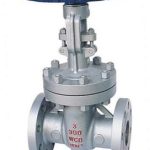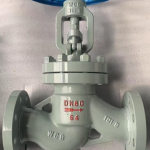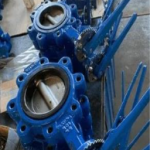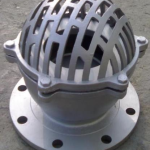Being important components of processes in manufacturing, valves control gas, liquid, and slurry flow in piping and machinery because they are a part of each process. For effective and safe operations, various industries such as power generation plants, chemical plants, water treatment facilities, and oil and gas operations rely on different varieties of valves. An accurate selection in the valve is important when ensuring system integrity and optimizing efficiency. For the sake of helping companies make informed decisions, the book discusses the most common industrial valve types, where they are used, and how they function.
Working Mechanism:
Gate valves shift a solid gate up or down to allow or restrict flow with a rising or non-rising stem. In the fully open position, they reduce pressure drop by providing an unrestricted passage.
Applications:
- Water and wastewater treatment
- Gas and oil pipelines
- Power plants
- Chemical industries
Why Use Gate Valve?
- Ideal for on/off control
- Sufficient for applications involving high pressure
- When wide open, there is minimal flow resistance.
Working Mechanism:
Globe valves employ a movable disc or plug against a fixed ring seat to regulate flow. They are suitable for throttling service because they allow precise control of fluid flow.
Applications:
- Systems involving steam and condensate
- Refrigeration and HVAC
- Water distribution
- Petrochemical and Refining plants
Globe Valve: Why Use Them?
- Excellent flow control features
- Perfect for use in applications involving high temperature
- Durable and long-lasting
Working Mechanism:
Ball valves control flow through the action of a rotating ball that has a bore in it. The fluid passes through the pipeline when aligned with it; when rotated 90 degrees, the flow is shut off entirely.
Applications:
- Oil and Gas Industry
- Chemical Processing Plants
Why Choose Ball Valve?
- Rapid on/off capability
- Extremely Resistant and Minimal Maintenance
- Provides by a tight seal.
Working Mechanism:
A rotating disc is positioned in the center of the pipeline through butterfly valves. Efficient and compact operation is achieved by the rotation of the disc in order to regulate flow.
Applications:
- Water supply systems
- Cooling towers and HVAC
- Plants that produce electricity
- Shipbuilding and marine
Why Choose Butterfly Valve?
- Space-saving and compact design.
- Cost-effective for usage with a large diameter.
- Provides quick shut-off.
Working Mechanism:
Check valves utilize a swing or spring-loaded type to prevent backflow and allow one-way flow. Based on system pressure, they operate automatically.
Applications:
- Wastewater Treatment Plants
- Boiler Feed Systems
- Fire protection systems
- Gas and Oil
Why Choose Check Valve?
- Avoids reverse flow.
- Reduces pump failure and system damage.
- Less maintenance required for automatic operation.
Working Mechanism:
Diaphragm valves regulate flow through a flexible diaphragm. It is ideal for applications where contamination is an issue because the diaphragm prevents fluid flow by pushing against a weir or seat.
Applications:
- Treatment plants for water
- Corrosive fluid handling
Why Choose Diaphragm Valve?
- Perfect for hygienic and sterile applications.
- Immune to corrosive chemicals.
- Provide bubble-tight sealing.
Working:
Plug valves control flow through a tapered or cylindrical plug. In order to allow or prevent fluid flow, the plug rotates within the valve body.
Applications:
- Petrochemical processing
- Slurry and viscous fluid handling
- Fuel distribution and storage
- Paper and pulp industries
Why Choose Plug Valve?
- Can manage abrasive and viscous fluids.
- Provides a tight shutdown.
- Suited for fast operation.
Working:
To avoid overpressure conditions in equipment and pipelines, pressure relief valves automatically release the excess pressure.
Applications:
- Boilers and steam systems
- Oil refineries
- Gas Processing Plants
- Electricity-generating stations
Why Choose Pressure Relief Valve?
- Ensures system safety and protection.
- Automatically dissipates excess pressure.
- Critical for preventing system failure.
Choosing the Right Valve for Your Industry:
Several conditions impact the valve choice, such as:
- Fluid type (gases, corrosive fluids, clean liquids, slurries)
- Operating temperature and pressure
- Flow control needs (backflow prevention, throttling, and on/off regulation)
- Material compatibility (brass, cast iron, stainless steel, etc.)
- Expectations of maintenance and lifetime
Industrial valves play an important role in a wide range of industries in that they provide effective and controlled flow of fluids. Accurate choice of valve to employ, say a gate valve for high pressure pipes or a butterfly valve in applications where there is limited space, is indispensable to system effectiveness and safety. SVR’s comprehensive range of industrial valves includes solutions tailored specifically to the demands of each industry. Call today to choose the perfect valve for your particular application!
Buying high-quality valves is essential to boost output, reduce downtime, and ensure safety in a dynamic industrial landscape. Industries can ensure regulatory compliance and significantly enhance operational efficiency with proper valve selection.











